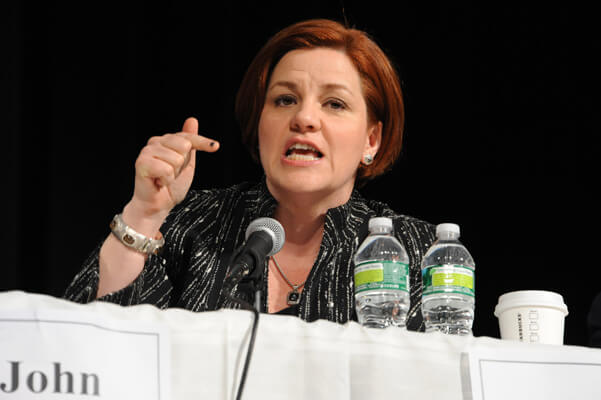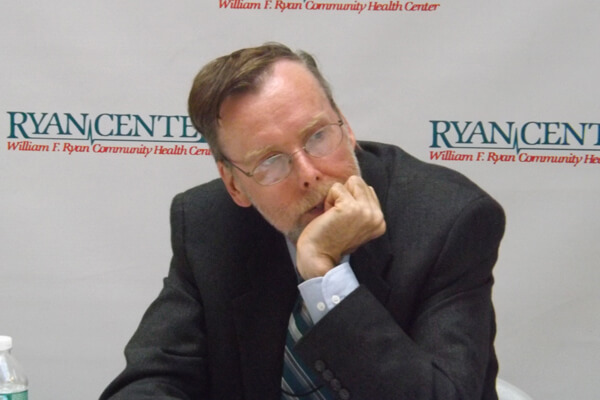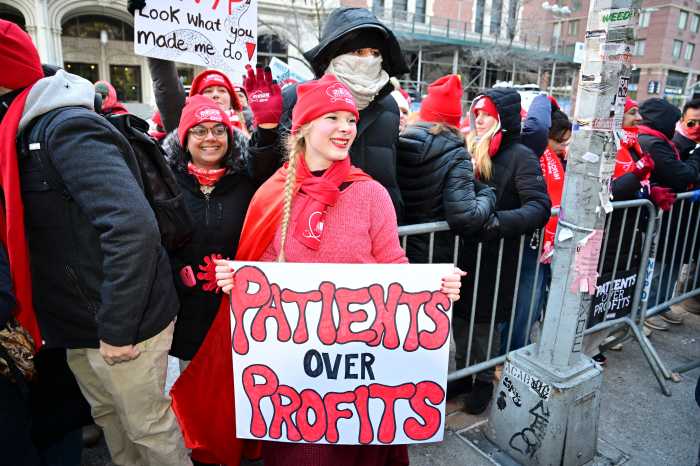I could plant a big wet kiss on Mayor Bill de Blasio’s cheek for putting Dr. Demetre Daskalakis in charge of AIDS policy. Daskalakis is a persuader, an exciting man who understands his subject. Before he became a deputy commissioner in the city health department, he led a team that visited New York City bathhouses to test for HIV and STDs. He’s a public health professional who helps people where they are.
The last left-leaning mayor, David Dinkins, had a terrible time appointing a health commissioner. His choice, while black, was a Republican from the Midwest who had signed on to contact tracing as a viable strategy during the height of the AIDS epidemic. Asking people to name their sexual contacts was a scary idea, and ACT UP chanted, ‘Woody Myers, you just try it, we’ll go out and start a riot.” Political leaders spent many, many hours refereeing that dispute.
That memory is germane as the New York Post tries to recreate racial tensions and paint a portrait of a bumbling administration that undermines the police. The mayor’s foes want a repeat of their victory over Dinkins: he lasted one term. Defeated by Rudolph Giuliani, Dinkins was followed by 20 years of Republican mayors.
The cosmopolitan Daskalakis soothes troubled waters. An engaging man, he is keeping disputatious factions within the LGBT community talking to each other while finding friends for the mayor. The positive impacts on gay men are visible.
Debate ripples through the community, as big changes happen. Discrimination against people with HIV is being tackled. Stigmas are challenged, and once again people with the virus are speaking up and announcing themselves.
For years, it was understood that men who were on their meds could say, “I’m negative.” Meaning, truthfully, “I won’t hurt you,” even while being untruthful about the medical facts. This year, in growing numbers, positive folks announce they are “undetectable” — the medical equivalent of “cured.” It happens in the bars and on the web. HIV had regained its human face, and we learn that normal people are positive. The hurtful idea that only an irresponsible person gets HIV is countered. It’s been a long time since I’ve heard a poz person dismissed for having earlier been a “bug chaser.”
Related to all this, of course, is that PrEP has come into the sunshine. Those seeking dates announce they are on PrEP. Tim Murphy broke the news about “sex without fear” in a big way in New York magazine last summer, in a story that explored how PrEP is relieving anxiety, and also noted Daskalakis’ role in persuading the FDA to make PrEP a daily treatment option for uninfected individuals.
These changes pass my smell test, and they affect acquaintances I have far from the usual political circles. Two 20-year-olds I know independently decided to use it. Sexually active since their mid-teens, both have stayed negative and seem unlikely to seroconvert, but they now have an added measure of safety.
How is the city health department helping? By publicizing those doctors who are prescribing PrEP and establishing a responsive website for those with questions.
And, thanks to Obamacare, the young now have medical insurance. For young gay men, that means preventative care, a game changer. The administration listened to progressive demands, and that is working a healthcare revolution in the gay community.
I never thought condoms were the only answer. I grew up when condoms were practically the only form of birth control. Did we have problems with teenage pregnancy? Yes we did, and with STDs also. The new PrEP era will also have problems, but it won’t bring back the orgiastic binges of the disco era. The community’s attitudes have changed too much, and the emphasis in recent decades on relationships is here to stay.
After AIDS, the idea that sex is always harmless has no credibility. The unquestioning embrace of unrestrained coupling that existed in the ‘70s is gone, and sex-positive people operate in a different climate, one tempered by realism. But PrEP was developed because gay men, especially young gay men, will have evenings with multiple partners, and that need not mean they will seroconvert. The evidence is clear; it works. And it doesn’t require perfect adherence. Miss taking your pill and you have the chance to get back on track the next day.
We spend too much time fretting about noncompliant patients. It’s actually insulting to suggest that people with multiple partners are heedless and won’t take the pills. We said the same thing about needle users, and they are now well below the radar on seroconversion, with less that a hundred new infections per year in New York, while in the gay community, there are about 3,000 cases of new diagnoses each year. If needle users can avoid HIV, so can gay men.
Will we bring down seroconversion as dramatically among sexually active gay men? It’s too early to say. But one obstacle is seldom mentioned. The biggest challenge comes not from people refusing to take the pills, but from government dealing so harshly with people that they become incarcerated, unemployed, or homeless and therefore live totally chaotic lives. We used to force drug users to rely on dirty needles. Now, we jail young people for marijuana. Quality of life arrests, high rates of unemployment, and too much homelessness — often aggravated by mental illness — create a class of people who are barely surviving. Asking them to place a priority on health is often an unreasonable demand.
Mayor de Blasio is making progress, and the health department is a bright spot that demonstrates that. This not the work of a bumbling mayor, but of a man who is keeping his campaign promises.


































